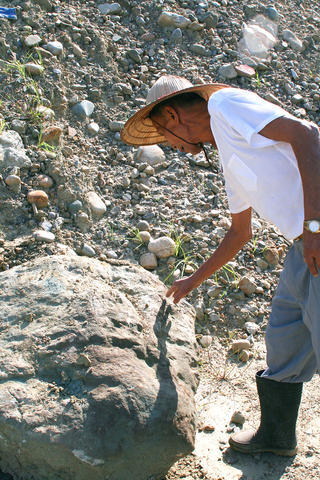A historian called yesterday for stronger conservation measures for Lo Sheng ("Happy Life") Sanatorium after discovering fossils at the construction site of an MRT maintenance depot last month.
The Taipei County sanatorium is a sprawling complex built during the Japanese colonial era to isolate people suffering from Hansen's disease, also known as leprosy. Plans to tear down most of the sanatorium's buildings to make room for an MRT maintenance depot have met with strong opposition.
Activists protested the demolition on the grounds that it meant evicting its residents.

PHOTO: LOA IOK-SIN, TAIPEI TIMES
They received support for their cause when Tamsui-based historian Chi Jung-ta (
"The hills [of Lo Sheng] are composed of sedimentary rocks, which contain fossilized remains of prehistoric marine life such as seashells, since [the area] was once seabed," Chi explained to the Taipei Times in a telephone interview.
After consulting with Chen Wen-shan (陳文山), a geoscience professor at National Taiwan University, Chi said that the fossils belonged to the Pliocene era, "which is at least 5 million years before our time," Chi said, adding that further examination would be needed to gain a more detailed picture.
Unfortunately, a lot of the rocks with fossils have been destroyed, Chi said.
"When I went to the construction site in June, I saw them [construction workers] breaking the rocks into sandstone to use as construction material," he said.
Chi said there were many tombs of Chinese settlers from the Qing Dynasty within Lo Sheng's perimeter.
"We could make the entire area into an on-site exhibition not only of Taiwan's public health history, but also of the history of settlers and of paleontology," Chi said.
Fang Juang-lih (
"I've asked the [Taipei] County Cultural Affairs Bureau and the construction firm to further investigate the matter and submit a report," he said.
"We'll decide what to do after receiving the report," he said.
Although the discovery was made last month, the construction was only halted on Tuesday after an assistant to Taipei City Councilor Lin Jui-tu (

Alain Robert, known as the "French Spider-Man," praised Alex Honnold as exceptionally well-prepared after the US climber completed a free solo ascent of Taipei 101 yesterday. Robert said Honnold's ascent of the 508m-tall skyscraper in just more than one-and-a-half hours without using safety ropes or equipment was a remarkable achievement. "This is my life," he said in an interview conducted in French, adding that he liked the feeling of being "on the edge of danger." The 63-year-old Frenchman climbed Taipei 101 using ropes in December 2004, taking about four hours to reach the top. On a one-to-10 scale of difficulty, Robert said Taipei 101

Nipah virus infection is to be officially listed as a category 5 notifiable infectious disease in Taiwan in March, while clinical treatment guidelines are being formulated, the Centers for Disease Control (CDC) said yesterday. With Nipah infections being reported in other countries and considering its relatively high fatality rate, the centers on Jan. 16 announced that it would be listed as a notifiable infectious disease to bolster the nation’s systematic early warning system and increase public awareness, the CDC said. Bangladesh reported four fatal cases last year in separate districts, with three linked to raw date palm sap consumption, CDC Epidemic Intelligence

Taiwanese and US defense groups are collaborating to introduce deployable, semi-autonomous manufacturing systems for drones and components in a boost to the nation’s supply chain resilience. Taiwan’s G-Tech Optroelectronics Corp subsidiary GTOC and the US’ Aerkomm Inc on Friday announced an agreement with fellow US-based Firestorm Lab to adopt the latter’s xCell, a technology featuring 3D printers fitted in 6.1m container units. The systems enable aerial platforms and parts to be produced in high volumes from dispersed nodes capable of rapid redeployment, to minimize the risk of enemy strikes and to meet field requirements, they said. Firestorm chief technology officer Ian Muceus said

MORE FALL: An investigation into one of Xi’s key cronies, part of a broader ‘anti-corruption’ drive, indicates that he might have a deep distrust in the military, an expert said China’s latest military purge underscores systemic risks in its shift from collective leadership to sole rule under Chinese President Xi Jinping (習近平), and could disrupt its chain of command and military capabilities, a national security official said yesterday. If decisionmaking within the Chinese Communist Party has become “irrational” under one-man rule, the Taiwan Strait and the regional situation must be approached with extreme caution, given unforeseen risks, they added. The anonymous official made the remarks as China’s Central Military Commission Vice Chairman Zhang Youxia (張又俠) and Joint Staff Department Chief of Staff Liu Zhenli (劉振立) were reportedly being investigated for suspected “serious